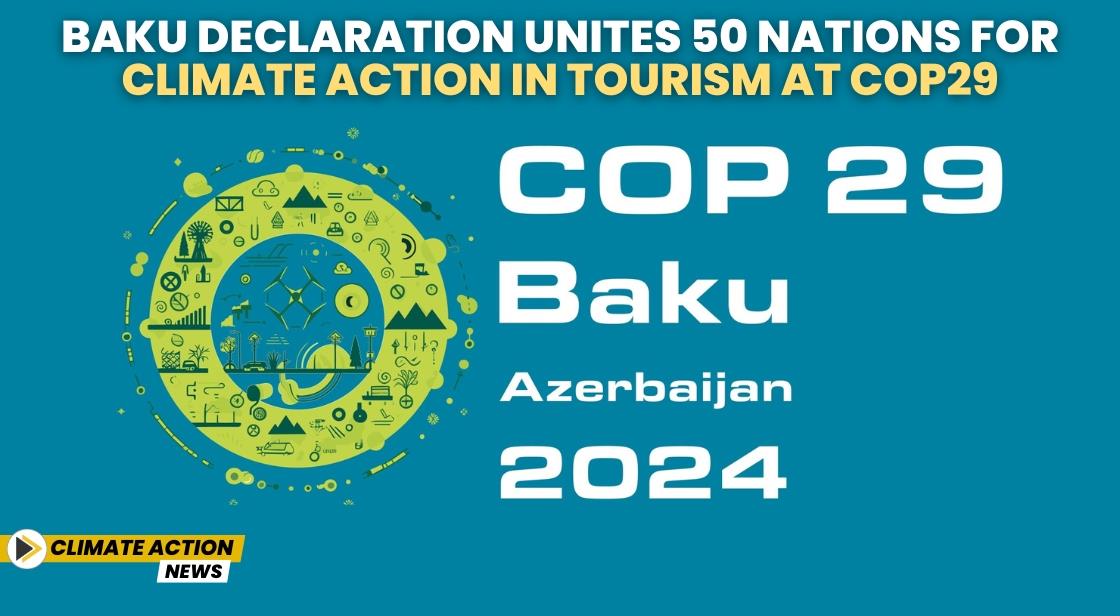Baku Declaration Unites 50 Nations for Climate Action in Tourism at COP29

News Synopsis
In a landmark decision, the 29th United Nations Climate Change Conference of the Parties (COP29) has introduced tourism into its global action agenda for the first time.
Over 50 countries have endorsed the COP29 Declaration on Enhanced Climate Action in Tourism, an initiative spearheaded by Azerbaijan’s COP29 Presidency. This declaration marks a significant milestone in reshaping the global tourism sector into a low-carbon, climate-resilient industry.
A COP Presidency spokesperson emphasized, “These initiatives are set to play a vital role in tackling climate change and promoting urban resilience,” highlighting tourism's pivotal role in driving sustainable development.
Tourism's Inclusion in the COP29 Agenda: A Historic Milestone
The tourism declaration is part of a broader effort by the COP29 Presidency to support this vital sector in adopting sustainable practices that significantly reduce its environmental footprint.
Tourism has been recognized as a dual-edged sword: while it contributes significantly to economic growth and provides livelihoods for millions globally, it also exerts pressure on ecosystems and is vulnerable to climate change impacts like rising sea levels, extreme weather, and biodiversity loss.
COP29 President Mukhtar Babayev remarked, “The inclusion of tourism in the UN Climate Change COP29 Action Agenda for the first time, under the Presidency of Azerbaijan, represents a milestone for an important economic and environmental sector.”
Key Highlights of the COP29 Declaration on Tourism
-
Climate Resilience: The declaration calls for innovative and collaborative efforts to transform the tourism industry into a climate-resilient, low-carbon sector.
-
Urban Climate Strategies: A focus on creating resilient and inclusive cities through multisectoral collaborations, aligning with the Multisectoral Actions Pathways (MAP) Declaration.
-
Global Ambitions: The declaration sets the stage for advancing climate action goals in the lead-up to COP30.
Global Travel and Tourism Council’s (WTTC) Net Zero Roadmap
At COP29, the WTTC unveiled the second edition of its Net Zero Roadmap for Travel and Tourism, showcasing the sector's accelerated efforts to align with global climate goals.
-
Surge in Climate Targets: The number of tourism businesses setting climate targets has grown by 27% in three years, with 53% of the 250 leading companies now committed to emissions reduction.
-
Science-Based Targets Initiative (SBTi): One-third of businesses have adopted SBTi goals, a notable increase since 2021.
-
Sustainable Aviation Fuel (SAF): SAF, which reduces aviation emissions by up to 80% over its lifecycle, is a cornerstone of the roadmap, with calls for expanded adoption and regulatory support.
Azerbaijan’s Role in Driving Sustainable Tourism
Kanan Gasimov, Head of Cabinet at Azerbaijan’s State Tourism Agency, highlighted the nation’s leadership in this initiative. “Through our COP29 Presidency, we have successfully advocated for tourism’s inclusion in international climate discussions,” he said, emphasizing the importance of aligning tourism practices with global climate objectives.
Gasimov further elaborated on the importance of setting ambitious goals, stating, “This roadmap serves as both an actionable guide and a vision-setting tool for the industry, helping us set ambitious goals while providing clear steps to reduce emissions across all tourism subsectors.”
The Road Ahead for Tourism and Climate Action
The endorsement of the Baku Declaration and the launch of the updated Net Zero Roadmap highlight a growing recognition of the tourism sector's potential to drive climate action. By adopting innovative solutions, from sustainable fuel for aviation to eco-friendly accommodation, the sector can reduce its carbon footprint while contributing to global sustainability.
COP29 President Mukhtar Babayev aptly summarized the vision: “At COP29, it’s time to enhance ambition and enable action. We need to protect our natural heritage to create a sustainable future for tourism and the environment.”
Conclusion
The inclusion of tourism in COP29’s action agenda is a landmark achievement, signaling the sector’s transition from a major emissions contributor to a pivotal player in the fight against climate change. Initiatives like the Baku Declaration and the Net Zero Roadmap underline the commitment of global leaders to reshape tourism into a sustainable, low-carbon industry.
Azerbaijan’s leadership in this arena, coupled with the support of over 50 nations, sets a precedent for collaborative global action. The focus on sustainable practices and innovative solutions, such as SAF and cross-sector partnerships, provides a roadmap for other industries to follow.
As tourism aligns with global climate goals, the sector holds immense potential to support not just economic growth but also the preservation of natural heritage and the empowerment of local communities. This collective effort will ensure a future where tourism thrives in harmony with the environment, setting the stage for sustainable development on a global scale.
You May Like









